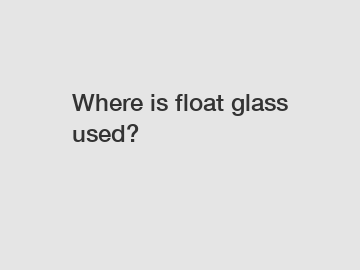Where is float glass used?
Where is float glass used?
Float glass is widely used in various industries and applications due to its excellent optical clarity, flatness, and smooth surfaces. The manufacturing process, which involves floating molten glass on a bed of molten tin, results in a high-quality product with uniform thickness. This article will explore the different uses of float glass and discuss the significance and impact it has in various fields.
Float glass finds its primary application in the construction industry. It is extensively used for windows, doors, and architectural facades. The exceptional clarity of float glass allows natural light to pass through, creating well-lit and visually appealing spaces. The flat and smooth surfaces make it ideal for glass installations, ensuring easy cleaning and maintenance. Additionally, float glass possesses high thermal insulation properties, contributing to energy efficiency in buildings. The use of float glass in construction not only enhances the aesthetics but also improves the overall sustainability of the structure.

In the automotive industry, float glass plays a crucial role in manufacturing windshields and windows for vehicles. Its high optical quality and transparency ensure optimal visibility for drivers and passengers. The ability to produce large, seamless sheets of float glass allows for seamless installation, reducing the risk of leakage and improving the structural integrity of the vehicle. Furthermore, the strength and durability of float glass provide safety benefits, as it minimizes the risk of shattering during accidents. In addition to cars, float glass is also used in the production of aircraft windows and other transportation systems, further highlighting its significance in ensuring safety and functionality.
Another significant application of float glass is in the production of mirrors and glass furniture. Float glass, with its pristine surface and exceptional reflectivity, is used for manufacturing high-quality mirrors. Its uniform thickness and lack of distortion make it ideal for creating clear and accurate reflections. Additionally, float glass is used in the production of glass tables, cabinets, and display cases, providing an elegant and stylish aesthetic to interior spaces. The versatility of float glass in the production of decorative and functional glass furniture showcases its role in interior design.
In conclusion, float glass is utilized in a wide range of industries and applications. Its outstanding optical clarity, flatness, and smooth surfaces make it an ideal choice for construction, automotive, and interior design sectors. The manufacturing process of float glass ensures a high-quality product, which is not only aesthetically pleasing but also contributes to energy efficiency and safety. Overall, the extensive use of float glass demonstrates its significance and impact in creating sustainable and visually appealing environments across different fields.
For more what is floating glass, how much weight can refrigerator shelf hold, tempered glass specificationinformation, please contact us. We will provide professional answers.

Comments